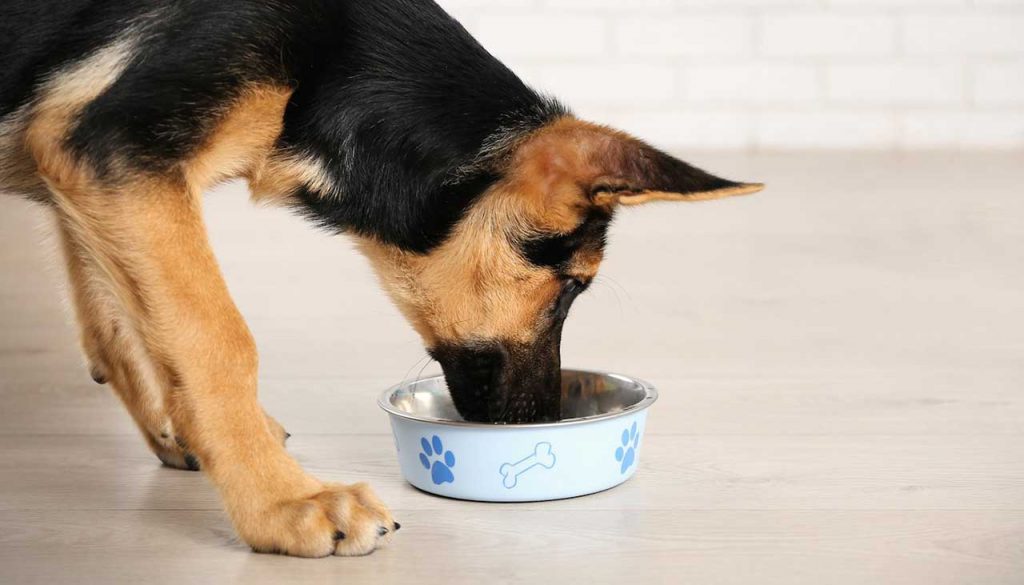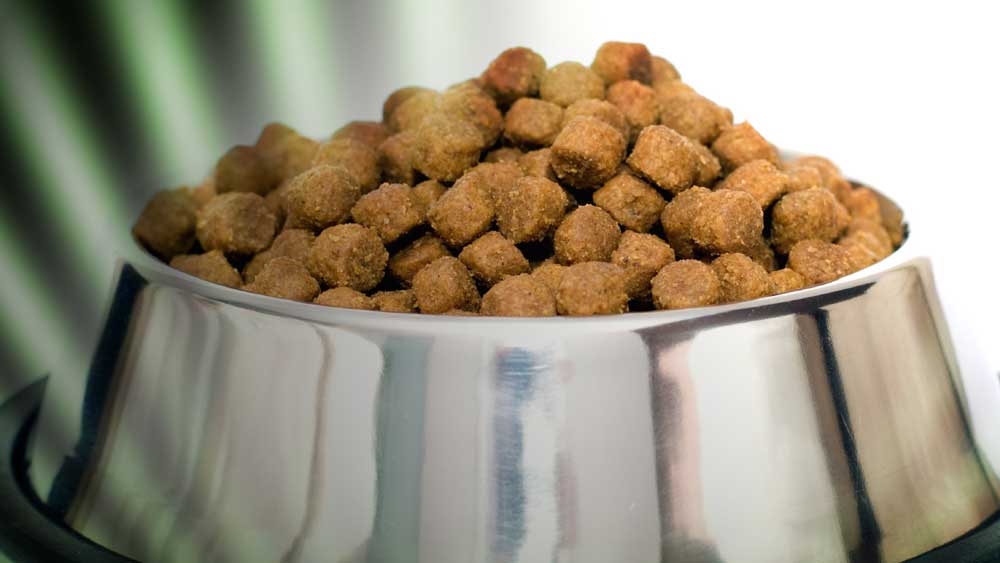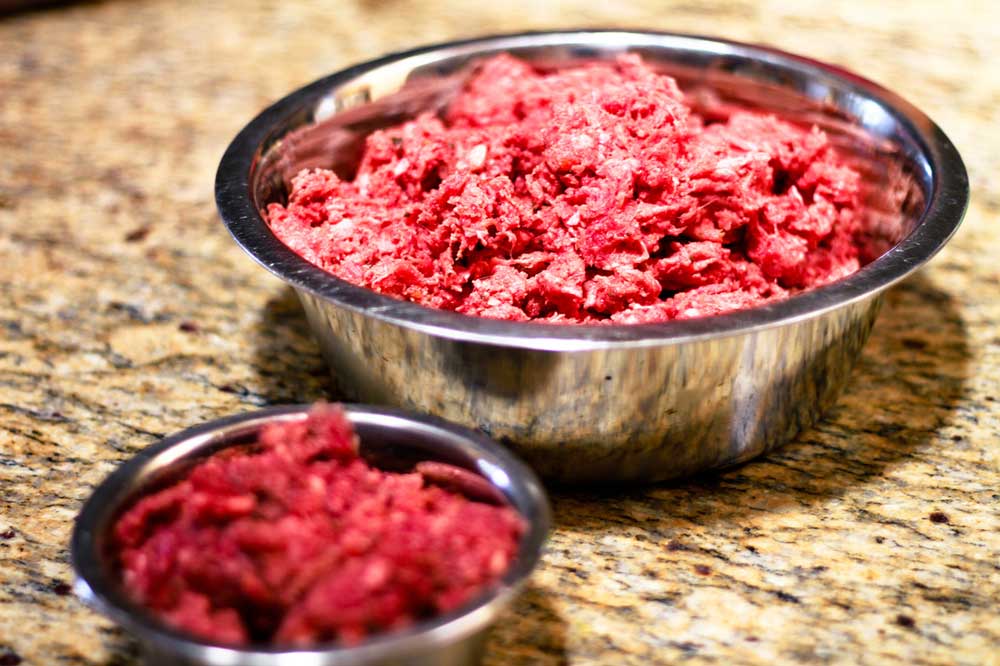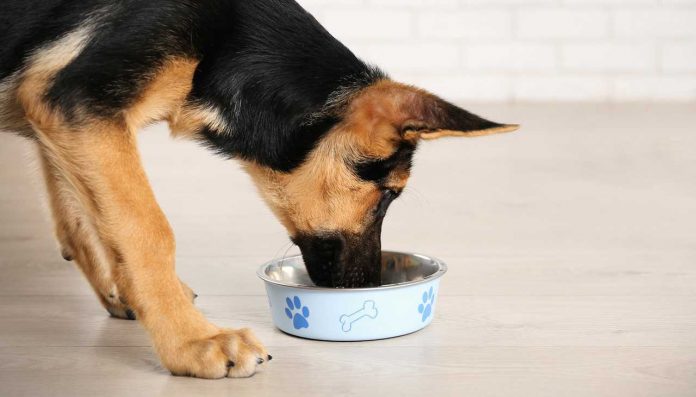Proper nutrition is the key to the health of your pet. The German Shepherd can only be fed a specific range of products or high quality ready-to-eat foods.
The breed has a small gastrointestinal tract, high intestinal permeability and enzyme activity. These features must be taken into account when drawing up a diet.
Correctly selected food will help avoid digestive problems and prolong the life of your pet.

Principles of feeding German Shepherd puppies
In the process of growing up, German Shepherd puppies need to be properly looked after and fed with a balanced diet.
Physical development of a shepherd dog lasts up to 18 months. During this period, animals are especially vulnerable, so it is important to think over their diet in advance. Food must fully cover the needs for vitamins, macro- and microelements.
The puppy needs to be fed several times a day:
| Age, months | Number of meals per day |
| 1-2 | 6 |
| 2-3 | 5 |
| 3-5 | 4 |
| 5-12 | 3 |
When feeding, you should follow several rules:
- The puppy should eat the food right away. After 20 minutes, the bowl is removed, even if there is still food left.
- They walk with the animal before or 1.5-2 hours after eating.
- The maximum allowable break between feedings is 8 hours.
- The dog is fed in one place, which is chosen once and is not changed during its life.
- Water is poured into a separate container. It is changed 3-4 times a day so that the pet can quench its thirst at any time.

Feeding a German Shepherd puppy is carried out at certain hours. From birth until 1 month old, babies are given food at the same time, even at night, because they still cannot cope with hunger. Older pets receive food only during the day.
Puppy diet
In the first 10 days after the appearance in the house, the puppy’s nutrition should consist of the same products that the breeder gave him – when buying, he must provide all the necessary information. A sharp change in the composition of the feed is fraught with a deterioration in well-being and indigestion.
The new menu for the German Shepherd is built according to their age. The first 6 months are the most important in a pet’s life. During this period, it grows at the maximum rate, therefore, its future directly depends on the quality of food.
It is believed that it is best to feed your German Shepherd puppy with natural food. However, quality ready-to-eat food is a convenient alternative. Both nutritional approaches have pros and cons. Therefore, each dog breeder decides on his own what to feed his ward.
Feeding puppies should be considered in more detail – at each age, the nutrition of a German shepherd has its own characteristics.
1 month
A 1-month old German shepherd puppy requires a responsible attitude to care and feeding. He still feeds on breast milk, but at this age they are already beginning to introduce complementary foods.
The lactating German Shepherd is also given a balanced diet to keep it from starving. The amount of food is increased by 1.5-2 times, in agreement with the veterinarian, vitamin and mineral supplements are introduced. If there is not enough milk, newborn babies are fed manually through a pipette with special mixtures or milk.
At 1-month old German shepherd puppies:
- Give finely chopped raw meat;
- Try to introduce boiled eggs;
- Vegetable purees are prepared daily.
You cannot feed a month-old German Shepherd puppy with any other food. If the baby has already been sent to a new home, milk must be introduced into the diet.

2 months
New products are gradually introduced into the menu. At 2 months old, a German shepherd puppy should be fed like this:
- Continue to give meat and vegetables;
- Replace milk with cottage cheese, kefir or yogurt;
- Start cooking porridge – buckwheat or rice.
A 2-month-old German Shepherd puppy can be fed properly prepared meat and bone broth:
- 4 liters of water are taken for 2 kg of raw materials;
- Put on a slow fire;
- Languish for 4-6 hours, avoiding boiling;
- Cool;
- Fat is necessarily removed from the surface.
The broth is added to cereals or given separately.
At home, a puppy is fed at 2 months 5 times a day. He has a fast metabolism, but a small stomach – he simply cannot eat much food. The food should be small enough for the dog to chew easily.
Sometimes the baby refuses to eat. This is an alarming signal that cannot be ignored. The reasons why a German Shepherd puppy does not eat well may be the following:
- Disease. If the baby has become lethargic and restless, an urgent need to contact the veterinarian. The specialist will diagnose and, if necessary, select a special diet.
- Lack of movement. Without walks and active games, the pet has nowhere to spend energy.
- Poor diet. A dog, like a person, prefers to eat different foods. You should enrich the menu and observe the reaction, otherwise you will have to feed the German Shepherd puppy exclusively with what he wants.
- Stress. The first days after moving to a new home, the pet may refuse food. Dog handlers recommend spending more time on it to speed up adaptation.
3 months
At 3 months, a German can already be given plant fiber – vegetables and fruits. They are rich in vitamins, macro- and microelements necessary for full development. Many dogs happily eat them raw, treating them as a treat.
At 3 months, a German shepherd puppy is fed:
- Carrots (boiled or raw);
- Apples;
- Watermelons;
- Sea fish (once a week).
Fermented milk products are given 2 times a day separately from meat and vegetables.
It is recommended to add unrefined sunflower oil to food to make up for the lack of vitamin D.
Otherwise, the diet of a German Shepherd puppy at 3 months remains unchanged. The portions increase slightly as the pet is actively growing.
4 months
From 4 months old, offal is allowed in the puppy’s diet. During this time, they need a lot of calcium, since the change of teeth begins. To make this process faster and painless for health, they increase the amount of dairy products or buy special supplements. At the same time, babies are allowed to gnaw bones.
If at 4 months old your German Shepherd puppy has not yet got ears, it should be fed with collagen-containing foods. This can be regular gelatin or products that contain it. To increase the color saturation, seaweed is introduced into the diet.
You need to feed a German shepherd puppy at 4 months in 4 doses. The size of a portion already reaches 400 ml, but its exact size largely depends on the individual characteristics of the organism.

5-6 months
At 5 months, the puppy continues to be fed as before. Tomatoes, pumpkin, cabbage and beets are added to vegetables. To improve the intestinal microflora, 1 g of brewer’s yeast is given once a day. Ground eggshells are added to replenish calcium reserves.
The frequency of feedings at 6 months is reduced to three. During this period, the diet is already as close as possible to an adult. Meat should occupy at least 30% of the total food volume. It can be given raw after freezing for 3 days to kill the parasites. The daily feeding rate is increased to 4.5 liters.
In a year, the dog is considered an adult – now it is fed 2 times a day.
Industrial food
Some dog breeders prefer to use dry food for a German shepherd puppy. Products are divided into several classes:
- Economy – consists of waste, instead of meat, animal fats, bone meal and tendons are most often added. The main source of protein is cereals – corn, soybeans, wheat. Contains harmful additives – dyes and flavors.
- Premium – the share of meat components is about 30%. The composition contains vitamins, macro- and microelements, the most important amino acids. There are fewer artificial additives here than in economy-class forages.
- Super Premium – nutritious, rich in fiber and vitamins. Differs in the absence of flavors and flavor enhancers. The line includes dietary and medicinal food. More expensive than premium food.
- Holistic is an elite product made from natural ingredients. About 80% comes from meat, extracts from vegetables, fruits, berries and herbs are added. Products of this class are the closest to the natural diet of animals.

Feeding your German Shepherd puppies with dry food has several advantages:
- Balanced composition eliminates the need to manually select proportions;
- No need to waste time cooking;
- It is easy to calculate the optimal dosage.
Remember, the health and life expectancy of the pet directly depends on the quality of the feed. In order not to harm the baby, you should choose premium and super premium food for large breed dogs. If there is an opportunity to buy more expensive feed, use the Holistic class feed.
Puppies can eat dry food starting from 2 months. The transfer to a new type of food is carried out in stages so as not to disrupt the digestive tract. Natural food is replaced with prepared food about 25% every 3 days. The granules are pre-soaked in water or kefir so that the pet does not scratch delicate gums.
It is easy to choose dry food for the German shepherd from the presented list:
- Premium class – Hills, Royal Canin, ProPlan, Araton and Probalance;
- Super premium class – Brit Kare, Gina Elite, Monge, Arden Grange and Bosch;
- Holistic – Grandorf, Nau Fresh, Akana, Savara, Origen, Pronatur Holistic and Genesis Pure.
You can buy ready-made meals at the pet store. Residents of small towns, where there is no such assortment of food for German shepherds, as in the city of Moscow, more often make orders via the Internet. Veterinarians agree that dry puppy food can be fed to a dog for up to a year.
The amount of dry food you need to feed your German Shepherd puppy per day is always written on the pack. Both overfeeding and underfeeding worsen well-being. Obesity leads to problems with joints, liver, kidneys and heart, and weakens the immune system.
The table shows the average feeding rate for a German shepherd puppy:
| Age, months | Amount (g) |
| 2 | 245 |
| 3 | 315 |
| 4 | 360 |
| 5 | 420 |
| 6 | 460 |
| 7 | 480 |
| 8 | 450 |
| 9 | 420 |
| 10 | 380 |
| 11 | 350 |
| 12 | 345 |
Adult dog diet
An adult German Shepherd can be fed both ready-to-eat food and natural food. From 3 to 6 years old she is in her prime – the dog is given a certain set of products that fully satisfy the needs of the body. Animals over 6 years old are considered elderly. In their menu, drugs are introduced that promote the regeneration of bone and cartilage tissues.
Natural products
When choosing natural products, it is important to properly organize the feeding of the German Shepherd. Proteins should account for up to 60% (meat fillets, offal, dairy products, fish, eggs), carbohydrates – up to 40% (cereals, vegetables and fruits), fats – up to 30% of the total diet.

It is recommended to feed an adult German Shepherd with the following foods:
30% of the total food volume is meat and by-products. It is advisable to include sea fish once a week. You cannot feed pork – it contains too much fat.
30% are cereals. Dogs are fed rice, buckwheat, oatmeal and barley with added meat. Barley, millet and semolina are less digestible; therefore, they are not suitable for daily nutrition. Porridges are made thick – the less liquid they contain, the better.
The menu also includes a small amount of fermented milk products: cottage cheese, kefir, yogurt. You cannot feed milk – adult dogs do not digest lactose.
In order for the pet to receive the necessary vitamins, he is given vegetables – pumpkin, cucumbers, tomatoes, zucchini. Fresh herbs are added in the summer. Fruit usually acts as a treat. Plums, apricots, peaches and grapes are excluded – they cause indigestion.
Occasionally a German Shepherd can be given bones. Only not chicken – they easily crumble and injure the esophagus.
Ready-made products
Feeding a German Shepherd at home is much easier to organize by choosing ready-made products. This option is often preferred by breeders who travel to exhibitions and cannot prepare natural food.
Dry food contains an optimal amount of useful elements, so there is no need to introduce vitamin complexes, just no need to buy food by weight. Without sealed packaging, it loses its positive qualities, changes color and taste. And due to high humidity, mold appears in it.
An adult German Shepherd, like a puppy, is best fed premium or super premium dry food. Low-grade brands will inevitably lead to health problems. The optimal dosage is prescribed on the package – usually it is 600-700 g per day.
Wet food for German shepherds is on sale. You can diversify the menu with canned meat, but it is not recommended to mix them with other food. If the dog previously ate natural food, then it should be gradually transferred to a new diet.

Feeding rules
The diet of a German Shepherd must be appropriate for its age, weight and level of physical activity. In order for food to be well absorbed, experienced dog handlers advise to follow some recommendations.
Feed your dog at the same time. The body gets used to receiving food at certain times, which has a positive effect on digestion. An adult German Shepherd should be fed twice a day.
Food should be at room temperature – not hot or cold.
Feeding time is about 20 minutes. After this time, the bowl is removed, even if the pet has not licked it clean.
Do not feed the animal if it has to move a lot to avoid volvulus or stomach.
Fresh water should always be readily available.
Better to feed your German Shepherd on a stand. Then the bowl will not “crawl” into the corner, and it will be more convenient for the animal to eat.
Prohibited foods
It is forbidden to feed the dog with most of the foods present on the human table. Even if the pet looks with plaintive eyes, begging for a tidbit, it is necessary to show firmness.
The German Shepherd must not be fed:
- Fatty meat;
- Salted, smoked, pickled, fried foods;
- Food with a lot of spices and herbs;
- Sausage products;
- Sweets and baked goods;
- Fish and tubular bones;
- Citrus fruits, pitted fruits;
- Coffee, carbonated and alcoholic drinks;
- Nuts;
- Legumes.
These products disrupt the functioning of the body, lead to systemic diseases and poisoning.
The puppy and the adult German Shepherd can be fed with natural food or industrial food – the choice falls on the shoulders of the breeder. But in any case, the food must be of high quality, otherwise the pet will have health problems.


